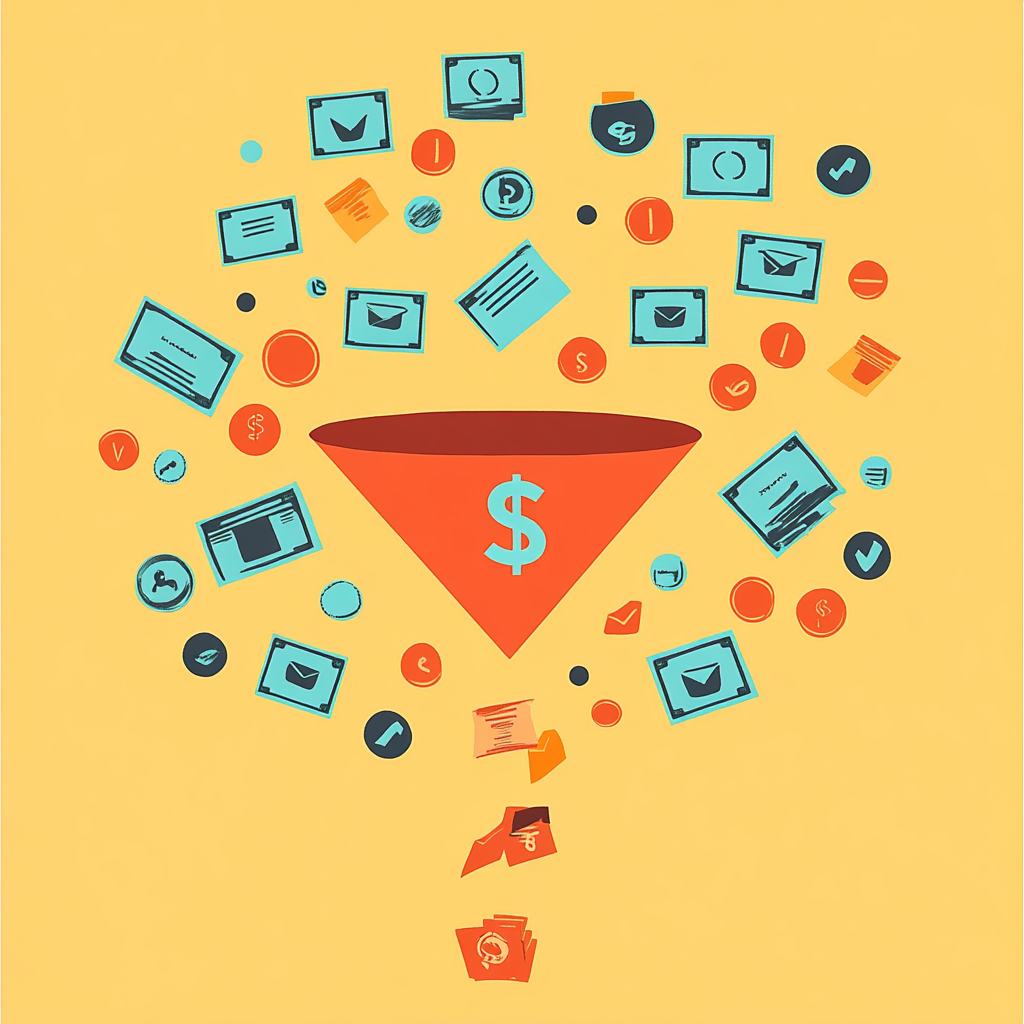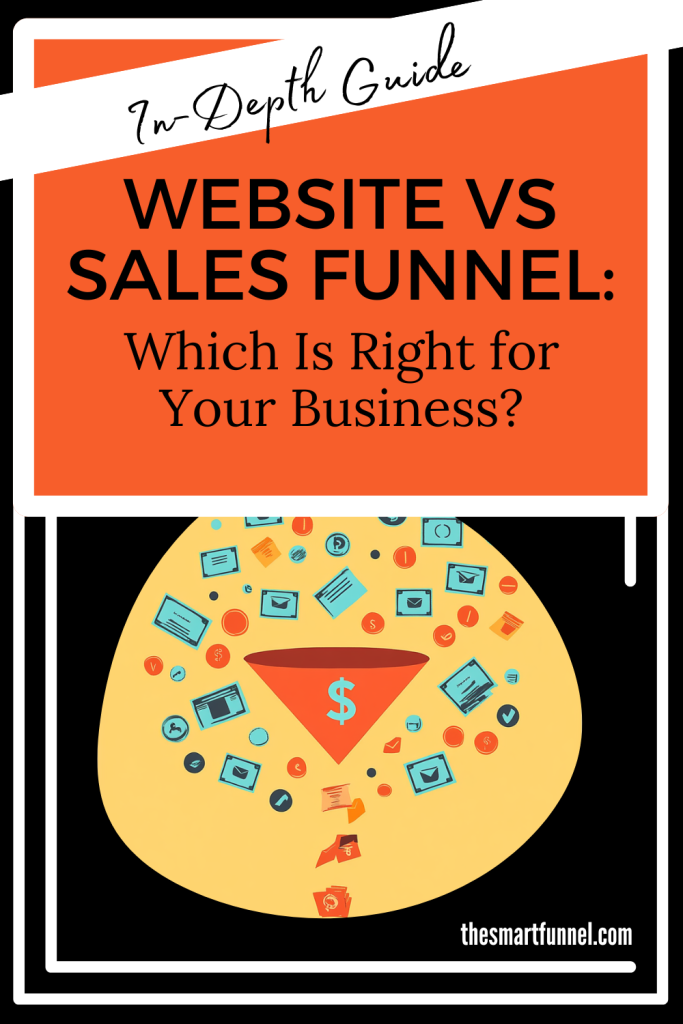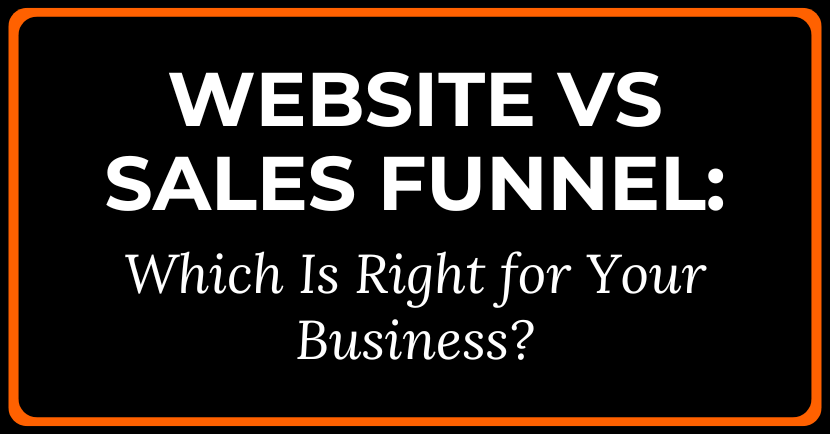What does your business truly need in the digital world? After all, if you want customers, you need to capture their attention the moment they find you online. Once you’ve piqued their interest, you then need to guide them smoothly towards making a purchase. So, really, your digital strategy comes down to two main options: website vs sales funnel. Let’s see which one might be the right fit for your business.

Understanding the Basics: Websites vs Sales Funnels
Let’s start by looking at what a traditional website and a sales funnel actually are. After all, if you’re aiming to attract potential customers, you need to know which tool suits your online presence best. A traditional website is like your digital storefront—it provides information, showcases your products or services, and helps build credibility. But sometimes, having various pages and options can overwhelm your visitors.
That’s where a sales funnel comes in. It’s a series of steps designed to guide people through the sales process, focusing on a specific action you want them to take. So really, the main difference between a website and a sales funnel lies in their purposes: one offers a broad overview, while the other leads customers down a conversion funnel toward a specific goal. Understanding this distinction is crucial if you want to optimize your marketing efforts.
Next, let’s dive deeper into each to see which might be the better fit for your business.
What Exactly Is a Website?
Let’s look at what a website truly is.
A website is your digital storefront—a collection of web pages that represent your business online. If you’re a business owner, having your own website is crucial for establishing an online presence. It allows you to showcase valuable information about your products or services, share blog posts, and connect with potential clients.
Search engines like Google index your site, making it easier for potential consumers to find you when they’re searching for what you offer.
The main goal of a website is to provide a platform where your target audience can learn about you, engage with your content, and eventually become customers. By optimizing your site with search engine optimization techniques, you can attract organic traffic and grow your online business over time. So, a website plays an important role in building credibility and reaching a wider audience.
What Is a Sales Funnel?
Now, let’s explore what a sales funnel entails.
A sales funnel is a marketing strategy that guides potential clients through a series of steps, ultimately leading them to make a purchase. Unlike a traditional website, which offers a broad overview, a sales funnel focuses on one specific action at each stage of the funnel.
The purpose of a sales funnel is to increase your conversion rate by directing your target audience down a clear path.
It starts with lead generation—perhaps capturing an email address—and progresses through nurturing the relationship until they become loyal customers. Sales funnel pages are designed to keep potential consumers engaged and moving forward in the customer journey.
This approach simplifies the sales process and focuses on converting visitors into buyers. So, the main goal here is to streamline your marketing efforts and focus on specific outcomes that benefit your business model.
Understanding the differences between a website and a sales funnel can help you decide which is the best tool for your needs.
The Purpose Behind Each Tool
Understanding why each tool exists can help you make the best choice for your business. A website serves as your digital storefront, providing valuable information about your products or services. It’s a great way to build credibility and attract organic traffic through search engines. Your own website allows you to share blog posts, showcase your business model, and engage with potential clients over a long time.
On the flip side, a sales funnel is designed with a clear goal in mind: to guide potential consumers through a specific customer journey. The purpose of a sales funnel is to convert website visitors into leads or customers by directing them through a series of steps. This tool focuses on lead generation and increasing your conversion rate by simplifying the sales process.
So, while both tools play important roles in digital marketing, they serve different purposes. One builds a broad online presence and the other drives specific actions from your target audience.
Common Misconceptions: Do You Fall into Either?
There are some common misconceptions that many business owners have about websites and sales funnels. Do you find yourself believing any of these?
Some think that just having a simple website is enough to generate a lot of sales. Others believe that a sales funnel is only for big companies with complex business operations. The truth is that both assumptions can be limiting.
Relying solely on one tool without understanding its specific role can hinder your marketing efforts. A website might attract a lot of people, but without an effective sales funnel, you might miss out on converting visitors into customers. Conversely, focusing only on a sales funnel without a broader online presence can limit your reach to potential clients.
Understanding the main reasons behind each tool helps you avoid these pitfalls. Both your website and sales funnel can work together to enhance your online business and meet your specific needs.
Mistake #1: Relying Solely on a Traditional Website
Are you putting all your eggs in one basket by depending only on your traditional website? If so, this might be the biggest problem holding back your business growth.
A website is a great way to establish your online presence and provide valuable information to your target market. However, without a clear goal or a defined path for visitors, you risk losing potential consumers. Website visitors may browse through various pages but leave without taking the next step in the customer journey.
An effective sales funnel addresses this issue by guiding potential clients through a series of steps with the ultimate goal of conversion. It focuses your marketing efforts on lead generation and increasing your conversion rate. By integrating a sales funnel into your business model, you can direct your audience toward specific actions, like signing up with their email address or making a purchase.
So, don’t make the mistake of relying solely on your website. Combining it with a sales funnel can significantly enhance your digital marketing strategy.
Mistake #2: Overlooking the Power of Sales Funnels
Are you underestimating how vital a sales funnel can be for your business operations? Some business owners focus solely on their websites, missing out on the benefits a sales funnel offers.
By neglecting this tool, you might be losing potential clients who could have been guided through a clear customer journey.
An effective sales funnel simplifies the sales process by directing your target audience toward a specific action, like signing up with their email address or making a purchase. This enhances your marketing efforts and increases your conversion rate.
So, don’t make the mistake of overlooking the power of sales funnels—they could be the key to unlocking a lot of sales for your online business.
When a Website Makes Sense for Your Business
There are times when a traditional website is exactly what your business needs. If your goal is to provide valuable information and build credibility over a long time, a website serves this purpose well. It’s a platform where you can share blog posts, showcase different products, and engage with potential clients.
By optimizing your site for search engines, you attract organic traffic, bringing in a lot of people interested in what you offer. So, if you’re focusing on establishing a strong online presence and offering various things to your target market, investing in a quality website makes perfect sense.
When a Sales Funnel Is the Better Choice
If your main goal is to guide potential consumers toward a specific action, then a sales funnel might be the best tool for you.
Sales funnels are designed to lead your target audience through the customer journey, focusing on lead generation and increasing your conversion rate. This approach is particularly effective for online marketing campaigns where you want quick results.
An effective sales funnel simplifies the sales process and focuses your marketing efforts on converting visitors into customers. So, if you’re aiming to boost sales and streamline your marketing funnel, choosing a sales funnel is the better choice for your business.
Can You Have Both? Combining Websites and Sales Funnels
Let’s consider whether combining a website and a sales funnel makes sense for your business.
The truth is, you don’t have to choose one over the other.
By integrating both, you can leverage the strengths of each to enhance your marketing efforts. Your own website serves as a hub of valuable information, attracting organic traffic through search engines and engaging potential clients over a long time.
Meanwhile, an effective sales funnel guides website visitors through a clear customer journey, focusing on lead generation and increasing your conversion rate.
This combination addresses different purposes: the website builds your online presence, and the sales funnel streamlines the sales process. So, merging these tools can be the best way to meet your specific needs and achieve your main goal.
Next, let’s explore how to decide which approach suits your business model.
Making the Decision: What’s Right for You?
Now that we’ve explored both options, how do you decide what’s right for you?
The first step is to consider your main goal. Are you aiming to build credibility and provide valuable information to a wide target market? Or is your focus on guiding potential consumers through a specific marketing funnel to boost sales?
Think about your business model and what your potential clients need.
If offering various things and attracting organic traffic through search engine optimization is important, a website might be the best tool.But if you want to increase your conversion rate by directing your audience toward a specific action, a sales funnel could be more effective.
Remember, understanding your specific needs and the different purposes each tool serves will help you make an informed decision.
Next Steps: Implementing Your Chosen Strategy
So, what’s the next step after making your decision?
If you’ve opted for a website, focus on creating valuable content like blog posts to engage your target audience. Optimize your site for search engines to attract organic traffic, and use social media to broaden your reach.
If a sales funnel is your choice, start by defining the specific action you want from potential clients—be it capturing their email address or making a purchase.
Design sales funnel pages that guide them through each stage of the funnel, enhancing your marketing efforts. And if you’re combining both, integrate your sales funnel into your website to create a seamless customer journey. This approach ensures you’re meeting different purposes while addressing your main goal.
Whichever path you choose, implementing your strategy thoughtfully is key to achieving success in your online business.
Conclusion: Choosing Between a Website vs Sales Funnel
Deciding between a website and a sales funnel ultimately depends on your business goals and the needs of your audience. If you aim to build a broad online presence and offer valuable information over a long time, a website might be the right choice.
On the other hand, if you’re focused on guiding potential clients through a specific path to increase conversions, a sales funnel could be more effective. Remember, you don’t have to choose one over the other—you can combine both to maximize your marketing efforts. Consider what aligns best with your objectives, and implement the strategy that will drive your business forward.
Pin This Post


